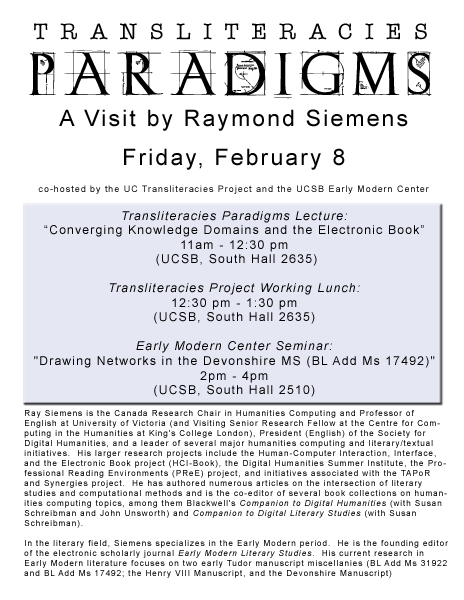
Co-sponsored by the UCI Software Culture Speaker Series and by the Transliteracies Paradigms Speaker Series – Thursday, April 10, UC Irvine
On Thursday, April 10, 2008, McKenzie Wark visited UC Irvine for a series of talks and interviews that was co-sponsored by Transliteracies. While there, he gave lectures on his projects GAM3R 7H3ORY and “totality.tv” and was interviewed about his experiences publishing GAM3R 7H3ORY online with CommentPress.
McKenzie Wark is an Australian-born writer on media theory, critical theory and new media. Among his best known work is a project with the Institute for the Future of the Book, a specially designed site that combined Wark’s interest in experimental writing techniques in networked media with his exploration of “Gamer Theory”. Wark is the author of seven books, among them A Hacker Manifesto (Harvard University Press, 2004), Celebrities, Culture and Cyberspace (Pluto Press, Sydney, 1998), The Virtual Republic (Allen & Unwin, Sydney, 1997), and Virtual Geography (Indiana University Press, 1994). He is Associate Professor of Culture and Media at Eugene Lang College,
New School, New York.
On CommentPress: Interview with McKenzie Wark: Kim Knight had an opportunity to sit down and talk with Wark during his UC Irvine visit. The interview is available for public download.
Full Video: .mov | .wmv
GAM3R 7H3ORY Talk:
Abstract: If game theory was objective, rational, abstract, then gamer theory is subjective, intuitive, particular. If game theory started with the self contained agent, like a prisoner in a cell, looking out at the world, then gamer theory wonders how the agency of the gamer comes into being as something distinct in the first place. The rise of the computer game as an emergent cultural form calls for an approach to cultural theory that might emerge organically out of the experience of game play. In an era in which many aspects of everyday life seem increasingly game-like, one might well ask what relation computer games have to this agon of the everyday. Perhaps computer games present ethos of the digital world in its pure form, as place where the ‘playing field’ really is level, where the rules really seem to be fair. Perhaps the computer game is the almost-utopian double to a world made over as a gamespace.
(Available via password to Transliteracies members only.)
Full Video: .mov | .wmv
Part 1: .mov | .wmv
Part 2: .mov | .wmv
totality.tv Talk:
Abstract: The Situationist International (1957-1972) was arguably the last of the historic avantgarde movements. While their work has been recuperated variously as art history, cinema, architecture or political theory, their avowed goal of superseding all of these separate forms escapes the academic division of labor. In this presentation I want to discuss both some neglected aspects of the Situationist legacy that might be relevant to today and also to present the website I have created (together with Chris France and Kevin C. Pyle) for work on the Situationist International at http://www.totality.tv
(Available via password to Transliteracies members only.)
Full Video: .mov | .wmv
Part 1: .mov | .wmv
Part 2: .mov | .wmv


